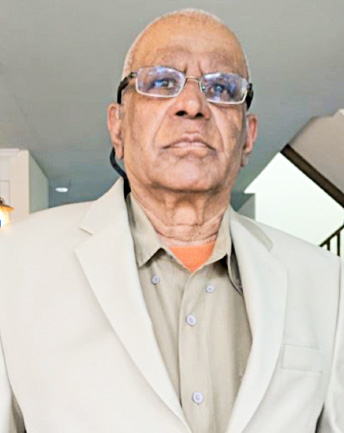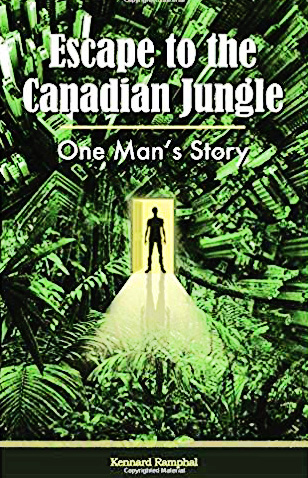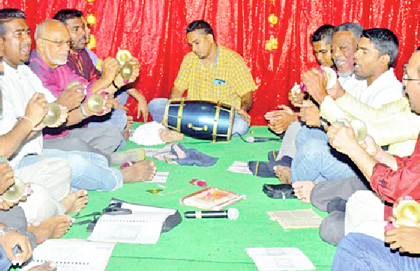| October 17, 2018 issue | |
Community Connection |
|
| Book launch of Ken Ramphal’s "Escape to the Canadian Jungle" | |
 |
|
| Author Kennard Ramphal | |
The Caribbean Canadian (CariCan) writers’ group announces the book launch of Ken Ramphal’s new novel “Escape to the Canadian Jungle” on Sunday October 28. Ken is one of the five members of the group of Canadian writers with roots in the Caribbean. The book launch runs from 3.00 - 5.00 p.m. at the Tropical Nights restaurant, situated at 1154 Morningside Ave., Scarborough (Morningside and 401). The author will be available to sign copies of his book, discuss his intentions in writing “Escape”, and will read selections. For those unable to attend the launch, copies of the book are available on amazon.ca at https://www.amazon.ca/Escape-Canadian-Jungle-Mans-Story/dp/1720849277/ref=sr_1_1?ie=UTF8&qid=1538284311&sr=8-1&keywords=escape+to+the+canadian+jungle and also from the author at kramphal@rogers.com or at telephone 905-239-8135. This is Ken's fourth book and one of two books coming from the Toronto based CariCan group this year. |
|
 |
|
About The Book In a land of immigrants like Canada, no tale should be more welcome than the tale of an immigrant fleeing a country that has grown too hot, to come to this so different place. The title of Ken Ramphal’s new novel “Escape to the Canadian Jungle” says it all. Baldeo, the prominent and successful soldier from tropical Guyana, finds he has to escape from the racial/political jungle that his Guyana Defence Force has become. He chooses Canada hoping to find something better, only to discover that Canada can be another kind of jungle, a concrete jungle, an urban nightmare just as bewildering and dangerous as the one he left behind. Baldeo’s task is to find his way in this new land, to replicate his success in the old country, and make a good place for himself and his family in Toronto, like the millions of other immigrants in this beating heart of Ontario and Canada too. His struggles are your struggles and my struggles as immigrants, or perhaps the struggles of an ancestor not too far removed up the generations. It is to the author’s credit that he makes “Escape to the Canadian Jungle” a success story over many obstacles, a redemption tale, a feel good story in the end. Who wants to read a feel bad story? Not me, and I suspect, not you either. And Baldeo does take his share of blows in the beginning. Ken Ramphal’s narrative takes us through the oh so familiar ground of the newbie finding Toronto so strange, so seemingly unwelcoming. His military resume and his degree from the University of Guyana don’t cut any ice in Canada, and he can’t find a decent job or an affordable apartment. Many of his relatives and former friends are not as respectful and helpful to the down and out security guard as they were when he was an army captain consorting with the president and leaders of the old country. His health begins to suffer, and he finds himself humiliated by the racism and discrimination in Canada. In this thinly disguised biography, we see a glimpse of the iron determination that made Baldeo a high achieving soldier of Indian descent in a predominantly black and hostile Guyana army. Baldeo is a fighter determined to do what it takes to find something better than security guard, to get higher qualifications and to become a qualified teacher in the East York Board of Education. Baldeo eventually earned a Ph.D. in education and, as Dr Baldeo, was appointed as a consultant responsible for the implementation of the Board’s Multicultural and Antiracism Policy. His redemption is complete. The ex-soldier disappears, and the Canadian jungle becomes eminently passable. Baldeo can dispense with the old Guyana passport and take the Canadian version, along with the new identity and place of respect. Migration to a new country gives one a chance to remake oneself, and Baldeo does exactly that. I think most people will enjoy this quite readable tale as I did, whether they are recent immigrants or not. A tale of redemption is always better than a tale of woe. And if a reader or two will take up the challenge as Ken Ramphal did, and leave something behind to show that immigrant X was here, he made it good, then it’s all to the better. For more info contact Ken Ramphal at kramphal@rogers.com or at telephone 905-239-8135 or CariCan publicist Ram Jagessar at ram.jagessar@gmail.com or telephone 416-289-9088. (Ram Jagessar) |
|
| I long for a return of the heart-warming feelings of bygone days | |
 |
|
| Chowtal singing at Phagwah time in Guyana with then President Donald Ramotar and Prime Minister Samuel Hinds taking part at State House. | |
By Vidur Dindayal |
|
 |
|
 |
|
| < Guyana Focus | |